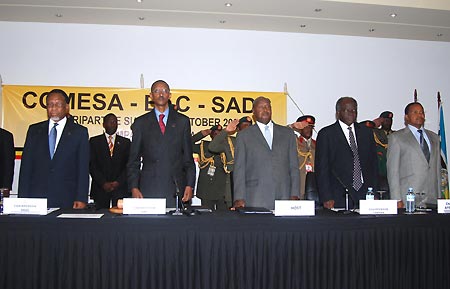The leaders of the members of the East African community (EAC),the Common Market for Eastern and Southern Africa (COMESA) and the Southern African Development Community (SADC), after a one-day summit, have agreed?in Kampala?to further deepen and widen cooperation and coordination in all sectors with an ultimate goal to form a super trade bloc.
The leaders have also shown their strong political will and pledged their commitment to the realization of the integration, saying the economic integration will benefit every member of the three blocs.
 |
|
(L-R) Acting President of South Africa, Kgalema Motlanthe, Rwanda President Paul Kagame, Uganda President Yoweri Kaguta Museveni, Kenya President Mwai Kibaki, and President Jakaya Kikwete of Tanzania, attend the official opening of the First COMESA-SADC-EAC Tripartite Summit on October 22, 2008. The East African community (EAC), the Common Market for Eastern and Southern Africa (COMESA) and the Southern African Development Community (SADC) kicks off its first tripartite summit in Kampala, Uganda, October 22, 2008. [Xinhua] |
The proposed establishment of a single market among them will surely have profound positive effects on the integration in the African continent. However, there will be no easy path ahead for them to realize the dream.
At the summit, the leaders talked a lot on how to coordinate and harmonize their trade arrangements which is seen as a must before they launch the proposed trade bloc.
Among the three blocs, the EAC has a functioning customs union. COMESA has planned to launch its own customs union by the end of this year. Meanwhile, the SADC is preparing to set up a customs union in 2010.
The EAC's free trade area is fully in force. COMESA is making progress toward a free trade area. The SADC formally launched its free trade area in August this year.
So the three blocs have to remove the tariff barriers and agree on common rules of origin to expand their economic and trade cooperation and integration.
"If we have the harmonization of policies we should not have a problem under the Economic Partnership Agreement (EPA)," John Mugerwa, executive secretary of Uganda's National Secretary for the tripartite summit, told Xinhua in a recent interview.
Multiple membership is also seen as a big hurdle in the process of the economic integration of the three, which the leaders attending the summit have reached a consensus to address.
The EAC is already a customs union but it shares four members with COMESA and one member with the SADC, said a document from the three communities.
Five of SADC members are also members of the Southern African Customs Union (SACU).There are 10 countries in the region which are already members of customs unions but all of them are also involved in the negotiations that are aimed at establishing alternative customs unions to the one they currently belong to.
Further, COMESA and the SADC have seven members in common that are not part of a customs union but are all involved in preparing customs unions for both COMESA and the SADC.
The integration process will also be hampered if the three blocs do not invest heavily to improve the poor infrastructure in most of the members.
The current road, railway, port networks used by these African countries were built by the colonialists and they do not link with each other. After their independence, the African countries have lacked necessary resources to repair, update, expand and connect the transport systems.
The rich foreign countries have been reluctant to invest in the infrastructure sector in Africa due to the quite unstable situation in the continent.
South African Finance Minister Trevor Manuel said early this year in a seminar that poor infrastructure has remained a severe impediment to more rapid growth and power reduction in Africa.
"Some of the handicaps affecting African economies are a legacy of colonialism – railways and roads leading from the interior to the coasts but not between contiguous countries," the finance minister said.
"Today Africa's transport costs, local, national and international, are around twice as high as those for a typical Asian country. Shipping a car from Japan to Abidjan costs 1,500 US dollars, whereas moving it from Abidjan to Addis Ababa costs 5,000 US dollars," he pointed out.
Despite these challenges, all the members have seen integration as a imperative.
"There is no other way except to work together. Integration is a global phenomena," Julius Onen, deputy secretary general of ESC in charge of programs and projects on the tripartite summit, told Xinhua in a recent interview.
"Whether it is in Europe, whether it is in America, whether it is in Asia, that is a world of integration. Your immediate opportunity is your immediate neighbor and that potential is tremendous," Onen added.
(Xinhua News Agency October 23, 2008)